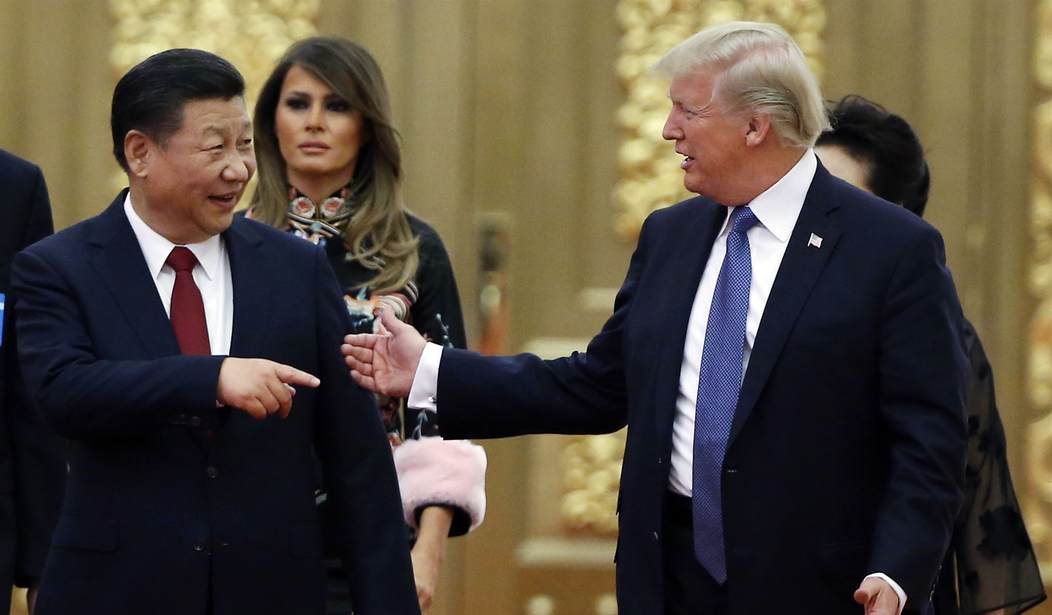No doubt, when President Trump announced in March his administration's intention to place tariffs of 25% on $50 billion in Chinese imports, many of his critics, and many Chinese apparatchiks, believed he was bluffing. Surely even a “loose cannon” like Donald Trump wouldn't start a trade war with China, at the very moment that we desperately need Chinese help to bring North Korea to heel...
It now appears clear, however, that this first installment of tariffs against China will soon be implemented. If the Chinese follow through on their threats to retaliate, our announced plan is to expand our tariff regime to cover an additional $100 billion in Chinese goods. In short order, therefore, roughly a third of Chinese imports could be subjected to tariffs.
Much as the global elite may be shaking in its boots at the prospect of a U.S.-China trade war, ordinary Americans should applaud these moves. President Trump is showing backbone. He is following through on measures recommended to punish China for its long-term strategy of restricting U.S. exports, hampering U.S. investment in key Chinese industries, and disrespecting U.S. intellectual property rights. These have all been concerns for successive American presidents, but none, until Donald J. Trump, have had the moxie to do more than complain about this pattern of economic subterfuge and manipulation. This is because, each time a president contemplates harsh measures against China, elder statesmen, talking heads, and corporate lobbyists swoop in to remind us all of the dangers of “protectionism”. We're told that it's impolite and downright irrational to stand up for our national economic interests...and all those jobs that we've lost were doomed anyway, so get over it! President Trump, though, is swimming against the globalist tide. He's calling the Chinese on their economic shenanigans, and he's making it clear that there are consequences for rule-breaking and dishonesty.
Recommended
In the end, the future of international trade doesn't lie with trade wars, with protectionism, or with tariffs. President Trump's actions should be seen in the proper light, therefore: his decision to slap $50 billion in tariffs on the Chinese is not meant to choke off trade between our two countries, but to emphasize the need for China to come to the negotiating table and make meaningful concessions. Already, the Chinese have signaled a willingness to do so. They have reportedly offered to buy as much as an extra $200 billion per year in U.S. exports. For the moment, however, this is mere talk. No conclusive deal has been reached, and many times before the Chinese have telegraphed their reasonableness, while behind the scenes they maintain their manipulative and duplicitous trade policies.
What we need now, therefore, is a clear indication from President Trump that “there is a new sheriff in town” when it comes to trade. The Chinese must understand that the obfuscations that have kept past presidents at bay will not work on this one. Trump's voters sent him to Washington to cause a sea change in our trade policies and to stop the loss of American jobs. He cannot and should not accept the maintenance of the status quo. That would be a betrayal of his supporters, in addition to his ideals.
Tariffs on $50 billion in Chinese imports won't have a decisive impact on U.S.-Chinese economic relations, nor will they significantly impact the U.S. economy. What they will do, however, is get the attention of Chinese negotiators, who have never before seen a U.S. administration that takes its obligations to the American worker so seriously. As President Trump has noted, the Chinese, given their massive trade surplus with the U.S., have a lot more to lose in any trade war than we do. Presumably, therefore, they are already dreaming up ways to placate us, while maintaining the illusion that they were never that scared of Trump's tariffs.
It may take weeks, months, or years, but as President Trump has promised we will ultimately win our “trade war” with China, and when we do millions of Americans will be better off. If, in the meantime, we have to pay slightly more for flat screen tvs, then so be it. Our national self-respect and our economic future are on the line. Both are priceless.

























Join the conversation as a VIP Member